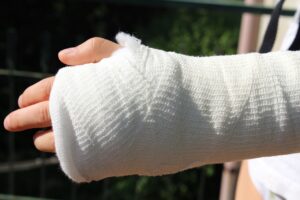Written by Chrystal Moulton, Staff Writer. Patients treated with marigold extract saw significant improvement in wound healing by day 14 (p<0.001).
 Despite advances in wound care for burn victims, treatments that accelerate wound healing are essential to the further progress in this area of medicine1. Marigold, Calendula officinalis, is a traditional herb used to treat skin damage, herpes, frostbite, as well as purification of the blood, ulcers, scars, and wounds2. Marigold also has antiseptic, anti-inflammatory, and antimicrobial properties3-5. In the current trial, researchers assessed the effectiveness of marigold extract on wound healing in 2nd degree burn patients6.
Despite advances in wound care for burn victims, treatments that accelerate wound healing are essential to the further progress in this area of medicine1. Marigold, Calendula officinalis, is a traditional herb used to treat skin damage, herpes, frostbite, as well as purification of the blood, ulcers, scars, and wounds2. Marigold also has antiseptic, anti-inflammatory, and antimicrobial properties3-5. In the current trial, researchers assessed the effectiveness of marigold extract on wound healing in 2nd degree burn patients6.
Sixty burn patients who were admitted to the hospital for 2nd degree burns and consented to participate in this clinical trial were included in the study. The study was designed as a triple blind, randomized, control trial. Patients were included if they had a 2nd degree burn wound with 15% to 50% burn area, aged 18-55 years old, not pregnant or breastfeeding, admitted to the hospital, and no more than 48 hours passed since the burn incident. Patients were excluded if they had underlying diseases, lack of cooperation, or due to hospital transfer, discharge, or death. Patients were randomly assigned to receive 2mg marigold extract capsules or placebo along with conventional burn treatment. The trial lasted 2 weeks. Baseline characteristics were captured at day 1. Researchers assessed each patient’s wound at day 1 (baseline), day 7, and day 14 using the Bates-Jensen Wound Assessment Tool (BWAT). A lower score on the Bates-Jensen Wound Assessment Tool (BWAT) is indicative of wound healing.
Of the sixty patients included 37 were male and 23 were female. Baseline characteristics were not statistically significant between the intervention and control groups. Burn surface, etiology, and indices were comparable between the two groups with no statistical significance. On day 1, the average wound assessment score in the treatment group was 48.23 ±5.51. In the control group, average wound assessment score was 48.90 ±5.92. At day 7, average wound assessment score in the treatment group was 35.93 ±6.58 and, in the control group, 42.57 ±5.58 (P<0.001). By day 14, the average wound assessment score in the intervention group was 22.97 ±4.31 and the average in the control group was 37.8 ±5.62 (P<0.001). The change in average wound assessment score from day 1 to day 14 was statistically significant in both groups (P<0.05). However, the treatment group saw a greater change in wound healing from day 1 to day 14 compared to placebo (-25.26 v. -11.1, respectively).
Results from this trial showed that marigold could be a beneficial addition to conventional burn care in accelerating wound healing. Additional research will be needed to verify these results.
Source: Rezai, Soraya, Kobra Rahzani, Davoud Hekmatpou, and Alireza Rostami. “Effect of oral Calendula officinalis on second-degree burn wound healing.” Scars, Burns & Healing 9 (2023): 20595131221134053.
© The Author(s) 2023 journals.sagepub.com/home/sbh
Click here to read the full text study.
Posted March 13, 2024.
Chrystal Moulton BA, PMP, is a 2008 graduate of the University of Illinois at Chicago. She graduated with a bachelor’s in psychology with a focus on premedical studies and is a licensed project manager. She currently resides in Indianapolis, IN.
References:
- Wang Y, Beekman J, Hew J, et al. Burn injury: Challenges and advances in burn wound healing, infection, pain and scarring. Adv Drug Deliv Rev. Jan 1 2018;123:3-17. doi:10.1016/j.addr.2017.09.018
- Hamad M, Mohammed H, Merdaw M. Antibacterial activity of Calendula officinalis flowers in vitro. Ibn AL-Haitham Journal For Pure and Applied Science. 2017;24(3)
- Pommier P, Gomez F, Sunyach MP, D’Hombres A, Carrie C, Montbarbon X. Phase III randomized trial of Calendula officinalis compared with trolamine for the prevention of acute dermatitis during irradiation for breast cancer. Journal of clinical oncology : official journal of the American Society of Clinical Oncology. Apr 15 2004;22(8):1447-53. doi:10.1200/jco.2004.07.063
- AshwlayanVD KA, Verma M. Therapeutic potential of Calendula officinalis. Pharm Pharmacol Int J. 2018;6(2):149-155.
- Waghmare J, Bhore NR. Effectiveness of calendula oil application on LsCs wound healing among mothers who has undergone LsCs. Amarjeet Kaur Sandhu. 2018;10(4):64.
- Rezai S, Rahzani K, Hekmatpou D, Rostami A. Effect of oral Calendula officinalis on second-degree burn wound healing. Scars Burn Heal. Jan-Dec 2023;9:20595131221134053. doi:10.1177/20595131221134053
